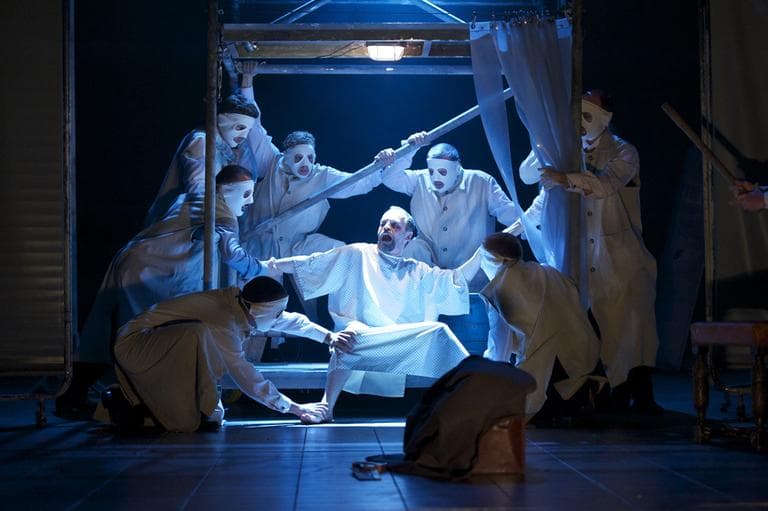Advertisement
Theater Around Town: Stretching The Shakespearean Envelope
ResumeWhat with the American Repertory Theater’s “Sleep No More’’ and “The Donkey Show,” the Boston area has been a laboratory for stretching the Shakespearean envelope. Take three current British productions as examples — “Sussurus” in the Public Garden, "Richard III’’ and “The Comedy of Errors’’ at the Huntington Theatre Company.
'Sussurus'

“Sussurus," a radio play inspired by “A Midsummer Night’s Dream,” is another of ArtsEmerson’s imaginative imports. You go downtown, where you pick up an iPod shuffle, headset and map and then head down Boylston Street to the Public Garden where you go from designated location to location listening to a radio play unravel (you get full instructions when you buy your tickets).
Once you start, after a bit of birdsong and music, the narrator reminds us what the play is about, and actors recite monologues from this drama by David Leddy, the brainchild of “Sussurus.” They portray family members of a mid-20th century opera singer who is preparing to sing in Benjamin Britten’s “A Midsummer Night’s Dream.’’
There aren’t any physical actors. You just watch the everyday scenes, the swan boats and swans, joggers and legions of dog-walkers. The story itself revolves around a homosexual scandal of some kind — this is about 60 years ago — with allusions to Oberon’s desire for the Indian boy in Shakespeare’s original, with Britten’s romantic partnership with the singer Peter Pears. The problems of repressed love and repressed lives are a constant from one to another.
The relationship of the story itself to what we’re seeing around is only sporadically successful. What does work is the transformation of the Public Garden itself from a place we walk busily through to a place to stop and smell the enchantment of this beautiful public space, the mysteries of life, and maybe be transformed ourselves.
'Richard III'

The two plays at the Huntington Theatre, meanwhile, are radical in their traditionalism as men play all the parts, as in Elizabethan days. Edward Hall, the director of Propeller, said that he wanted to investigate the dynamic of the plays as Shakespeare wrote them, liked what he saw and continued doing it.
Most noticeably, there’s no sexual tension, at least in these two plays. And that leaves the actors and audience a little freer to concentrate on other things — the language, the thematic concerns. And it’s a superb acting company, one that stresses musicianship, physicality and clear reading.
Richard Clothier as Richard III is exceptional, bringing out the charisma of despots like Richard. Too often, Richard is made to look like a raging nutcase, but there’s a lot of “A Clockwork Orange” and “Dexter” in this very violent, but somehow very funny, Richard.
'The Comedy of Errors’

“The Comedy of Errors,” meanwhile, is over the top in a different way — very cartoonish and slapstick. The women are played extremely broadly. But despite a lively production — several of the actors, including Clothier, are in a mariachi band singing songs like “Material Girl’’ — but the whole package isn’t nearly as funny as the actors seem to think it is.
While “Richard” is often funny, “Comedy” is also violent, albeit in a “Three Stooges” kind of way. Perhaps Hall is underscoring the violence beneath the ordered British façade, both in Shakespeare’s time and ours. And that “Clockwork Orange” sensibility is quite successful in both productions, particularly in “Richard III.”
This program aired on May 30, 2011.
